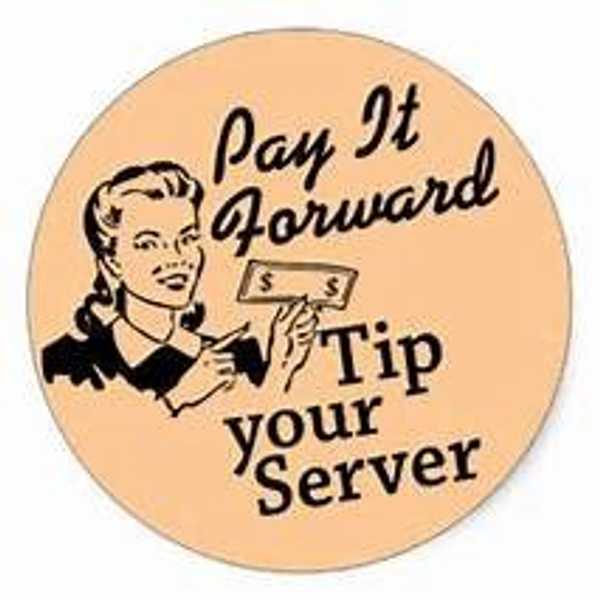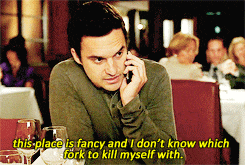A couple weeks ago, I wrote about the types of people you’ll meet working in a restaurant. While writing that article, I realized that I could write an entire article on restaurant jargon. After trying to explain something that happened at work to my mom, I noticed that the way servers speak to each other at work is almost a different language. So, here is a cheat sheet for people with server friends or newbies to the food service industry.
1. The expo line.
The line is the area between where the cooks prepare the food and where the server’s area is in the kitchen. It is where the cooks put the prepared food for the servers to pick up to take to their tables. If a meal is on the line, it should be ready to go, either with a ticket next to it or the order bumped on the expo screen*. If your job is to expo, it means you are to “pull” (take) the prepared meals from the line and “tray them” (put them on a tray) for the servers to take out to the tables. It can get pretty hectic on the expo line, especially on a busy Friday or Saturday night, so I’m planning on marketing the TV show idea, “So You Think You Can Expo?” to the Food Network.
2. The expo screen.
This is the screen by the line that shows all of the current orders that the kitchen is either about to prepare, preparing or ready. It’s usually color coded based on how far the cooks are into the order. It may be highlighted in yellow if the cooks received the order but have not started to work on it yet, orange if it’s in progress and green means it’s ready to go. If an order is highlighted in red, it means it’s late or the cooks are taking longer than they should to prepare it. Once you see “green on the screen,” the person working expo can “bump” or press the highlighted order on the touch screen, so that a ticket much like a receipt, which indicates all of the information about the order, including the server’s name and table number, comes out. This ticket is used by the expo person to arrange the entrees on a tray. That ticket is then given to the runner* so that they know which table to take the tray to.
3. Runner.
The runner is the person who takes the trays of food out to the tables. If one says, “run food out” it means take orders to tables. Sometimes that’s all runners do, but sometimes runners double as busboys. Oftentimes, runners are servers in training. Running food really helps future servers learn what the food looks like at a particular restaurant. Runners also take a little pressure off of servers. Even though servers are also expected to run food out, the convenience of designated runners gives servers more time to take orders, conversate with their tables, or bring drinks and refills to their tables. In movies, when cooks say “order up!” it’s kind of a cliche, because in a real restaurant, they would most likely say “runner!” indicating that they need someone to get the food off of the line before it becomes dead*.
4. Dead food.
When food has been sitting on the line for too long, even though it is under a heat lamp, it eventually becomes stale and cold. If there is dead food, it means that someone dropped the ball. Either the cook prepared the entree by mistake, the server put in the wrong order, the expo did not pull the entree at the right time, or the runner forgot to run the order out. It’s usually a happy accident for those in the kitchen because if the manager is nice enough, they’ll let the workers eat it. Otherwise, it just gets thrown out.
5. “Two” on “24.”
The quotation marks are to indicate that these numbers can be any numbers. The first number indicates the number of guests sitting at a table and the second number indicates which table they are at. A phrase like this one is usually said by the host to the server to let them know they have a table and how many people are sitting on it. You would typically hear a host say something like, “I sat you with four on 14.” These numbers are also marked on the host’s chart to keep track of how many tables each server has and to keep an eye on the “headcount,” which is how many people a server is serving in total. Another term for the amount of people at a table is “top,” so if a server says, “I have a three top,” that means they have a table of three people. The host’s chart is a good way to make sure the server doesn’t get overwhelmed with a high headcount and to make sure that the server is mainly sat with tables in their section*.
6. Sections.
If you go out to eat, even rarely, you know that servers work in sections. At the beginning of their shift, they are told which tables they will be serving and those tables are usually in the same area, so that the server doesn’t have to go all over creation to provide prompt service to their tables. If a server is seated “out of section” it means that they were given a table that’s not in their section for the night. Sometimes this happens if the restaurant is busy and the host needs to seat people at additional tables. Sections are usually comprised of four tables, possibly five depending on the restaurant’s traffic and how strong the server is, or how many tables they can handle at a time.
7. On the fly.
This means that an entree is needed ASAP. If “I need that lobster bisque on the fly” is said by a server to a cook, the cook knows that getting that cup of soup is their first priority. This is because the rest of that table’s order is already at the table and the soup is missing or because the soup was put on the line, but something happened to it so that it can’t be run out to the table.
8. Drop a check.
This literally just means that the server gave a table their check. Sometimes a server will let the host know that they dropped the check so that the host knows that a table is almost on its way out. A server might also tell a busboy that they dropped the check so that the busboy knows they will have a table to clean pretty soon. Just because a check is dropped doesn’t mean that the table is getting up right away though. Some guests like to sit at the table and talk for hours after they’ve already received the check or paid their bill. This is annoying. Don’t do this when you dine out. You are taking up a table in that server’s section, making it harder for them to turn the table*.
9. Turning tables.
This is basically a term for how quick the server can get rid of their tables. If a table just comes in to eat and get out, the server will turn that table pretty quickly. The process of turning a table is bussing the dishes, cleaning it and resetting it for the next guests. The faster a server can turn tables, the more tables they will have. The more tables a server gets, the more tips they get.
10. Side work.
Side work is the work that a server has to do in addition to taking care of their tables. This can be anything from drying and putting away silverware to breaking down* the beverage machines at the end of the night. Most restaurant goers don’t realize that servers have work to do other than serving food. This is why you should always tip your server well, because for the behind the scenes side work, they are only getting paid $2.13 an hour.
(*to disassemble the parts and clean them.)
11. POS system.
POS stands for “point of sales.” This is basically a glorified touch screen cash register. This is the computer where the servers enter the orders which are then sent to the kitchen. This is also where servers print the checks from and finish a transaction. If the computer is acting up, it can also be referred to as a “piece of sh*t.”
There are many other terms that are said in restaurants that people with no experience in the food industry would be confused by if they walked into a kitchen, but these are some of the main ones. Now, at least you can keep up with servers when they complain about their jobs!






















